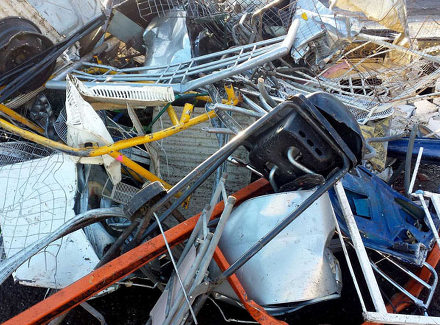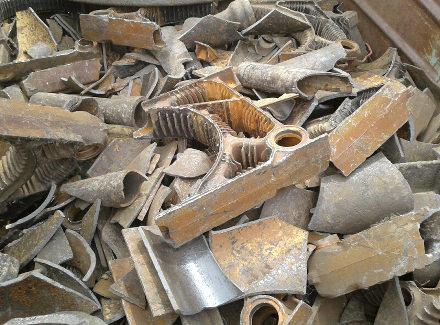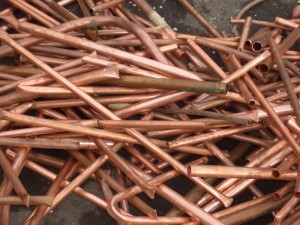later post | index | earlier post
What common metals can be recycled?
Tuesday, 15 October 2024

Can metal be recycled?
Yes, almost all metals can be recycled. This is because their properties are not diminished during the recycling process. Recycled materials like copper and aluminium can have a quick turnover in the circular economy.
Scrap metal recycling has many benefits from an environmental perspective, as fewer raw materials need to be extracted, carbon emissions are lower, and there is financial reward for both consumers and metal manufacturers. Recyclable metals are significantly cheaper to produce than new metal, and people can sell their unwanted scrap metal to companies like ASM.
What is the difference between ferrous and non-ferrous metals?
Metals suitable for recycling are generally sorted into ferrous and non-ferrous metals, and most are readily available in your home or your everyday life.
The main difference between ferrous and non-ferrous metals is that ferrous metals contain iron. Ferrous metals are also mostly magnetic, whereas non-ferrous don’t contain magnetic properties, making it relatively easy to tell them apart. Ferrous metals include steel, while aluminium and copper are two of the most common non-ferrous types of metals.
Non-ferrous metals do not rust, but they can corrode.
What metals can be recycled?
So while we have answered the question “can metal be recycled?”, we now need to know the main types of recyclable metals:

Iron
Iron can be used to make other metals, such as copper, so is highly sought after by recycling facilities. 90% of all the metal that is refined today is iron. Cast iron contains more carbon than other types of iron, and is found in items like pots and pans.
Steel
As a ferrous metal, steel is a major component in buildings, infrastructure, tools, ships, car parts, machines and appliances used across the world. According to environmental agencies, most steel items today contain between 25% and 100% recycled content. Carbon steel has over 90% iron content and is the most common ferrous metal. Stainless steel usually contains a high quantity of chromium, which keeps it corrosion resistant.
Aluminium
Aluminium is a similarly popular metal that’s capable of being melted at comparatively lower temperatures than steel, making it particularly attractive for recycling. Aluminium cans need just 5% of the energy to recycle them as they do to produce them from scratch; as well as releasing only 5% of the carbon emissions compared to newly produced metals. Just a single recycled aluminium can could save enough energy to power a 100-watt bulb for up to four hours
Sources for recycled aluminium include end-of-life vehicles, aircraft, boats, bicycles, computers, cookware, gutters and electrical wiring.

Copper
Premium-grade copper can hold up to 95% of the value of the original primary metal itself. Scrap copper wiring can be one of the easiest and most common sources of scrap metal, found in electrical cables, inside televisions, computer monitors, laptops and DVD players; within large and small electrical appliances, and in handheld electronics.
Brass
Malleable, conductive and resistant to corrosion and fatigue, brass is a popular metal for recycling. Energy costs for recycling brass are lower compared to those of other metals, and brass can be recycled multiple times without diminishing the composition. Common items which contain brass that could be recycled include plumbing fixtures and vehicle radiators.
Tin
Recycling tin requires 99 per cent less energy than creating it from scratch. A good source for scrap tin at home are old kitchen equipment such as soup ladles, woks and cooking bowls.
Zinc
One of the most often overlooked scrap metals, zinc can be recycled indefinitely without the loss of chemical or physical properties. End-of-life vehicles can be pulled apart and parts containing zinc can be recycled and transformed into like-for-like parts with the same material quality.
Sell your recyclable metals to ASM
With over 55 years of experience, ASM Metal Recycling will get the best price possible for your scrap metal. If you’ve discovered some scrap metal at home and you’d like to know how much it is worth, contact us and we’ll give you an accurate valuation using the latest technology. If you have a significant quantity of metal items to sell, we can arrange to collect it from you.
later post | index | earlier post
Recent posts
- What to do with radioactive scrap metal
- How does metal recycling benefit the economy and the environment?
- 5 common metals that can be recycled
- How does metal recycling work?
- How to Sort Metal for Scrap
- How to classify the different types of waste your business produces
- What is WEEE waste?
- Can iron be recycled in the UK?
- What has the most copper in it to scrap?
- How to better understand scrap metal pricing
- Is there a link between copper and brass prices?
- How to make money from cable scrap
- How many different types of copper are there?
- What can I sell to a scrap metal yard?
- Preparing for the collection of scrap metal